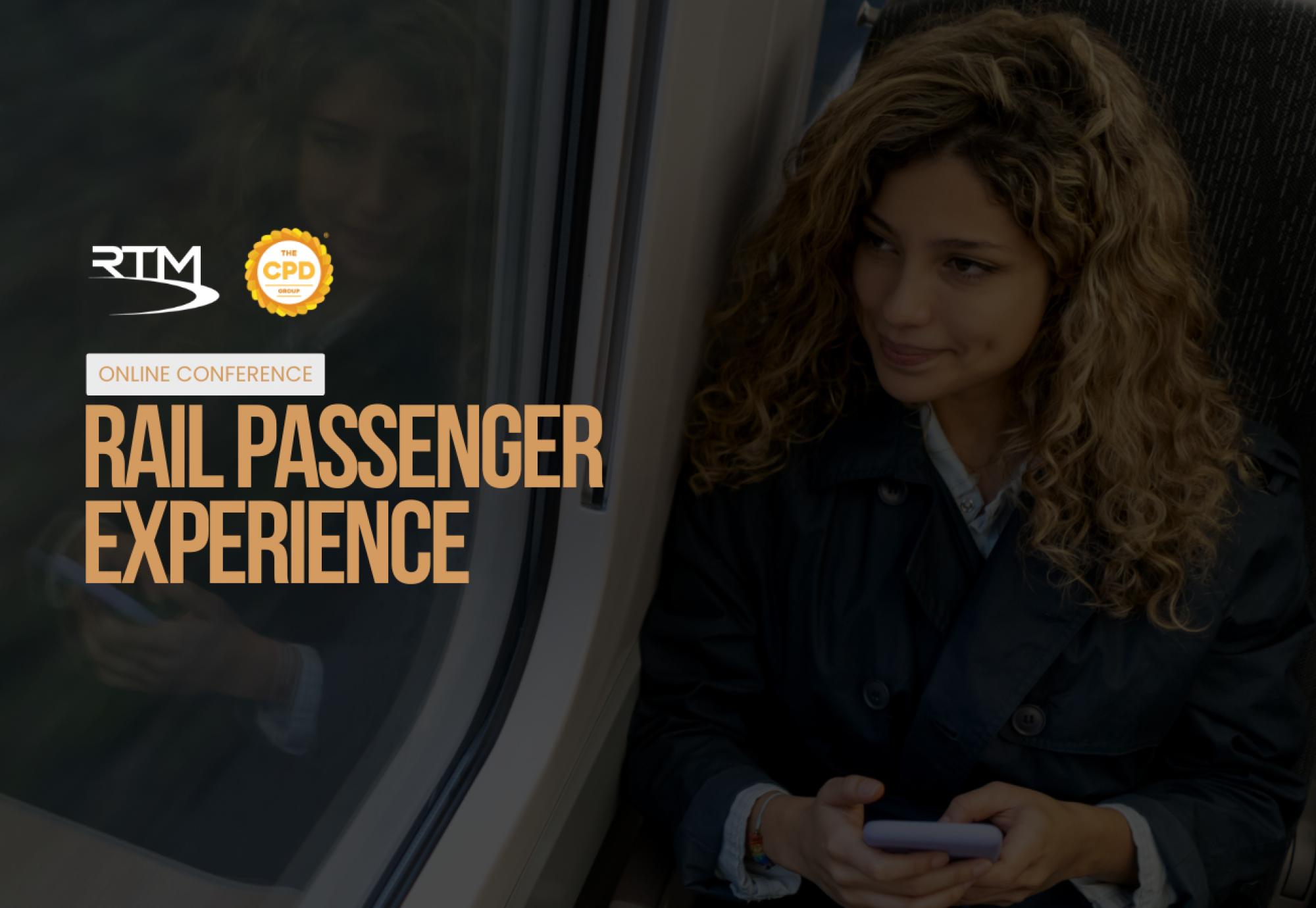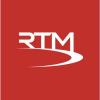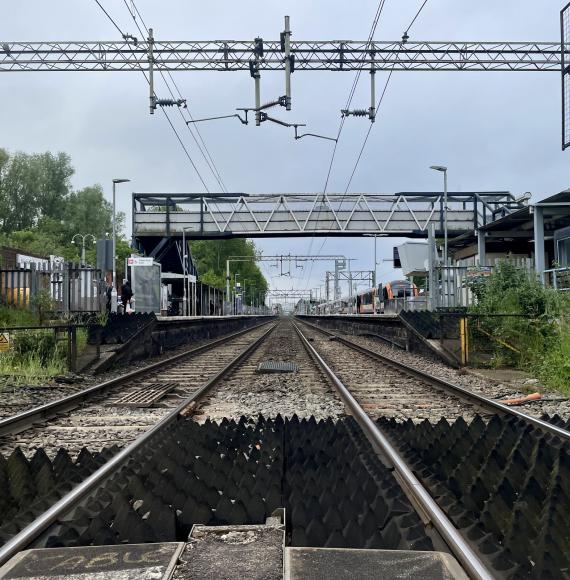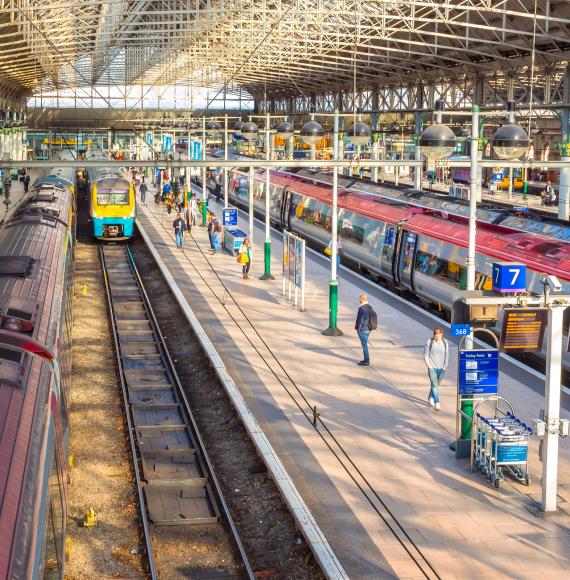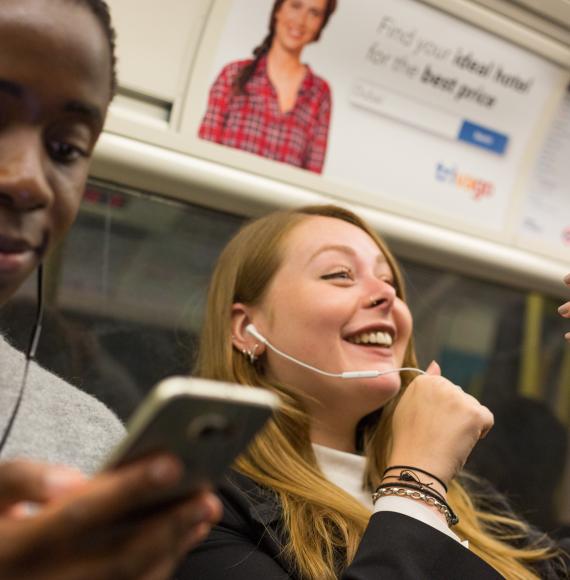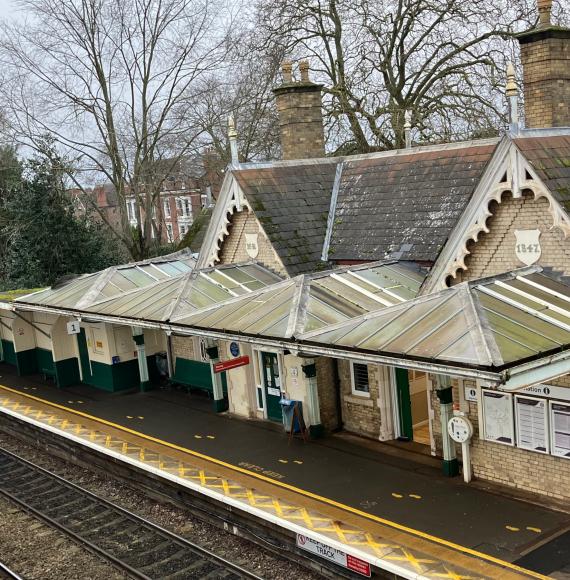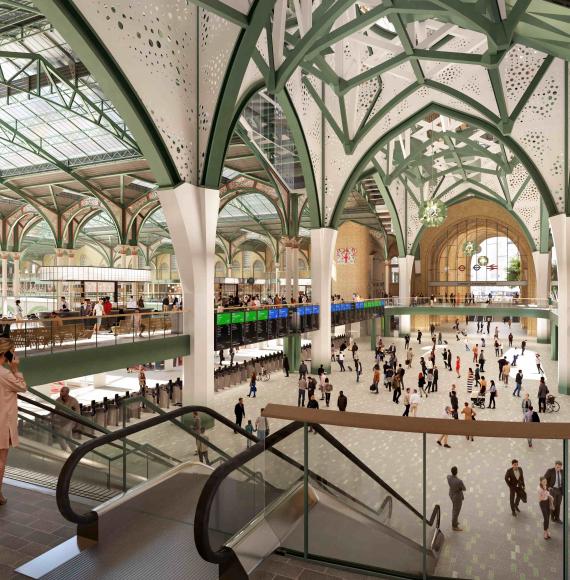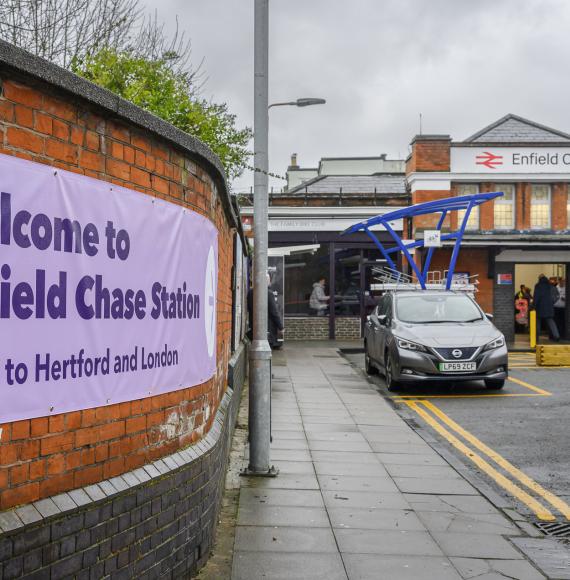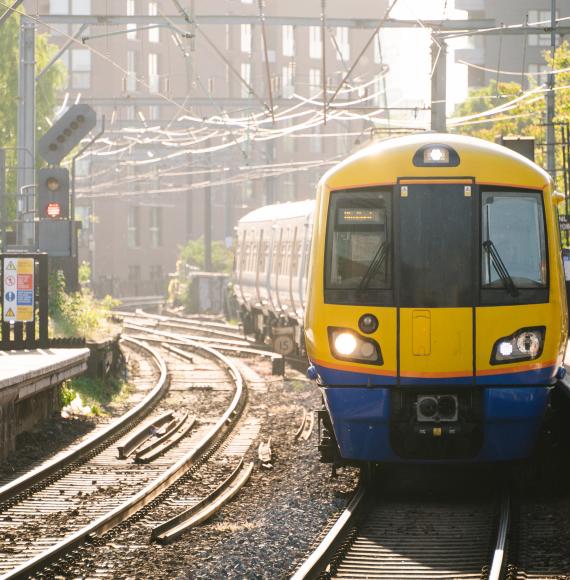Recently, Rail Technology Magazine held its Rail Passenger Experience Online Event. Here you can read about what was discussed in each section, and then you can watch the entire event yourself by clicking the link at the end of the page.
Keynote – Stephen Ireland
In a rapidly evolving world, the rail industry in the UK stands at a pivotal crossroads, one that promises to redefine the very essence of rail travel. Steven Ireland, Head of Stations Security and Customer Relationship Manager at Network Rail began the day with a very interesting keynote.
Steven told the audience that the past two years have seen significant transformations within the rail sector, driven by a government reform agenda aimed at enhancing efficiency and passenger satisfaction. The creation of the Great British Railway marks a crucial step towards unifying the network and ensuring a more passenger-centric approach. However, challenges abound, such as inconsistencies in fare enforcement and the pressing issue of fare evasion, which costs the industry millions annually.
Stephen highlighted the importance of customer satisfaction, emphasising that without passengers, the railway has no purpose. He passionately discussed the need to view passengers not merely as statistics but as individuals whose journeys and experiences matter. This shift in perspective is essential for fostering a more inclusive and responsive rail service.
He also addressed the pressing need for improved technology in rail travel. In today's digital age, passengers expect real-time information and seamless ticketing solutions. Steven outlined the necessity of integrating technology to enhance rather than complicate the passenger journey. The conversation extended to the importance of accessibility, ensuring that all passengers, regardless of their needs, can enjoy the benefits of rail travel.
We heard that as we explore the economic implications of a well-connected rail network, regions with excellent rail connectivity experience higher economic growth, making it imperative for the industry to invest in infrastructure improvements. The discussions around the Midlands Rail Hub and other initiatives reflect a commitment to not just maintain but to enhance the rail experience for future generations.
As we navigated through these critical topics, the keynote served as a call to action for all stakeholders within the rail industry. It is a reminder that the journey towards a more efficient, reliable, and customer-focused rail service begins with each of us. By prioritising passenger needs and embracing innovation, we can collectively shape a rail system that serves Britain for generations to come.
Rebuilding Passenger Confidence Panel Discussion
In a world where passenger confidence in rail services is more crucial than ever, our this discussion brought together a panel of experts to discuss how the industry can effectively rebuild trust among travellers. With the ongoing challenges of punctuality, cancellations, and communication, the rail sector must take proactive steps to address passenger concerns.
The discussion began with an exploration of what passenger confidence truly means. Guy Dangerfield from Transport Focus highlighted the importance of reliability—passengers need to know that trains will get them to their destinations on time and that they won't be left stranded during disruptions. This sentiment is echoed by Silviya Barrett of the Campaign for Better Transport, who identified cost as the number one barrier preventing people from using trains more frequently. The panel agreed that addressing affordability is essential for attracting more passengers back to the railways.
Mark Ilderton from Scotrail shared insights into how the company is enhancing the passenger experience. By redeploying staff from behind counters to more visible locations, Scotrail aims to provide better assistance to customers. This shift has resulted in positive feedback, demonstrating the importance of having staff available where they are needed most.
The role of technology in improving customer satisfaction is another key topic. Bob Powell from Avanti West Coast discussed the need for seamless communication between rail operators and customers, especially during disruptions. He emphasised the importance of training staff to provide empathetic support, ensuring that passengers feel cared for even when things go wrong.
As the panel delved deeper into the challenges faced by the rail industry, they discussed the significance of gathering and acting on passenger feedback. This engagement is vital for understanding what improvements are necessary and how to implement them effectively. The experts also highlight the importance of transparency in communication, ensuring that passengers are kept informed about delays and alternative connections.
Looking to the future, the conversation shifted towards upcoming rail infrastructure investments and how they can enhance the overall passenger experience. The panel agreed that a collaborative approach among rail operators will be essential for achieving these goals.
In conclusion, this session provided valuable insights into the steps the rail industry must take to rebuild passenger confidence. By focusing on reliability, affordability, and effective communication, the sector can create a more positive experience for all travellers.
The Digital Traveller
In this discussion, we delved into the dynamic world of rail travel in the UK, focusing on the pivotal role of digital innovation in enhancing passenger experiences. With a panel of industry experts, we explored the integration of digital platforms for seamless journey planning and ticketing, addressing the growing expectations of travellers in today’s tech-savvy environment.
The discussion kicked off with John Backway from the Rail Delivery Group, who highlighted the significant strides made in digital ticketing over the past few years. The transition from traditional paper tickets to digital solutions like e-tickets and mobile ticketing is reshaping how passengers interact with the rail system. This shift not only streamlines the ticketing process but also maximises revenue growth as the industry recovers from the impacts of Covid-19.
Accessibility is another crucial topic covered in this discussion. Sven Koster from GO Media shared insights into the innovative solutions being developed to ensure that all passengers, regardless of their needs, can access rail services. From digital totems providing information in British Sign Language to AI-driven navigation tools for visually impaired travellers, the industry is making significant efforts to create a more inclusive travel experience.
However, the journey towards a fully integrated rail system is not without its challenges. Duncan Henry, an independent rail strategy consultant, discussed the complexities of legacy systems that hinder innovation and the need for a cohesive approach to bring together various services under the Great British Railways initiative. The panel emphasised the importance of collaboration and open communication between stakeholders to overcome these hurdles.
Real-time information systems are also a focal point of the conversation. James Heslop from Network Rail explained how the industry is working to provide accurate and timely updates to passengers, ensuring they have the information they need to make informed travel decisions. The integration of data analytics and user-friendly interfaces is essential in achieving this goal.
As the discussion unfolded, the audience were encouraged to consider the future of rail travel and the exciting developments on the horizon. With advancements in technology and a commitment to enhancing the passenger experience, the rail industry is poised for a transformative journey ahead.
Keynote – Anthony Smith, Chair at Independent Rail Retailers
Anthony Smith, chair of Independent Rail Retailers, provided a compelling keynote address on the future of the rail industry. With the landscape of rail travel evolving, Anthony highlighted the critical role that independent retailers play in enhancing customer experience and driving growth.
One of the key themes of Anthony's keynote was the importance of customer-focused retailing. He argued that while the physical aspects of rail travel, such as trains and tracks, may remain static, the methods of selling rail services must transform. This transformation is crucial for attracting more passengers and ensuring that rail travel remains a viable and appealing option.
Anthony elaborated on the innovative ticketing practices that independent retailers are pioneering. From split ticketing to leveraging data for better pricing strategies, these retailers are adept at providing passengers with value for money. He noted that approximately 90% of online ticket sales are processed through independent rail retailers, which indicates their significant influence in the market.
Furthermore, Anthony addressed the upcoming changes with the introduction of Great British Railways and the potential impact on competition within the sector. He emphasised the need for a level playing field between public and private entities to foster healthy competition that ultimately benefits consumers.
The audience were encouraged to consider the implications of fare simplification and how it can affect affordability for passengers. Anthony stressed the importance of presenting clear options to customers, ensuring they are informed about ticket types and any restrictions.
The keynote concluded with a sense of optimism for the future of rail travel. Anthony expressed his belief that the railways have a vital role to play in sustainable transport and that the industry must adapt to meet modern expectations. With the right innovations and a focus on customer satisfaction, independent rail retailers are poised to lead the charge in making rail travel more accessible and appealing.
Accessibility for All
In this discussion, we engaged in a vital conversation about accessibility in rail travel, a topic that affects millions of passengers daily. With a panel comprising experts from various organisations, we explored the persistent barriers that disabled individuals face when using the railway network.
Emma Vogelman from Transport for All highlighted the critical need for consultation with disabled people in the planning and implementation of accessibility measures. She pointed out that many new infrastructures fail to consider the needs of those with disabilities, resulting in exclusion from essential services. Mark Cutter, independent chair of Northern's Accessibility User Group, echoed this sentiment by expanding the definition of disability beyond just physical impairments, emphasising the importance of considering neurodiversity and sensory challenges.
The discussion took a deeper dive into the shocking statistic that over half of the stations in the north of England are not fully accessible. David Worsley from Transport for the North provided insight into the ongoing efforts to enhance station accessibility through community engagement and feedback from potential passengers. The panel agreed that while progress is being made, much more needs to be done, especially in terms of staff training and the implementation of quick wins that can significantly improve the passenger experience.
Georgina Taylor from East West Rail shared her approach of integrating accessibility from the very beginning of new projects, ensuring that the voices of disabled individuals are heard throughout the design process. This proactive approach is crucial in creating a rail system that caters to all users, not just those who fit traditional accessibility criteria.
As the conversation unfolded, the panel discussed the importance of political pressure and the need for a coordinated approach to accessibility across the railway industry. They stressed that genuine change requires commitment from the top levels of governance, ensuring that accessibility is not just an afterthought but a fundamental aspect of rail travel.
The panel wrapped up with a call to action for the audience to engage with the topic and advocate for a more inclusive rail network. By raising awareness and pushing for necessary changes, we can work towards a future where rail travel is accessible for everyone, regardless of their abilities.
The Ticketing Dilemma
In this discussion we delved into the intricate world of the UK's rail fare structures and ticketing systems, a topic that has generated much discussion and frustration among passengers. The panel, comprising industry experts, shed light on the challenges and opportunities that lie ahead in simplifying ticketing for the modern traveller.
One of the key issues addressed was the complexity of the current fare structures. With hundreds of ticket types available, it’s no wonder passengers often feel overwhelmed and unsure if they are getting the best price for their journey. David Pitt, VP of UK Silver Rail Technologies, emphasised the necessity of surfacing better prices and enhancing customer choice. He pointed out that many passengers may prefer a longer journey if it means saving money, indicating a need for a more holistic approach to pricing.
Technology plays a pivotal role in this conversation. Thomas Lynch, head of Digital Products with the Fares, Ticketing, and Retail programme at GBRTT, highlighted the importance of creating a fare system that passengers can trust. The integration of mobile apps and smart cards is seen as a way to streamline the ticketing process, making it easier for passengers to access the information they need. However, the panel acknowledges that while technology can improve efficiency, it is crucial to ensure accessibility for all customers, including those who may not be digitally savvy.
The discussion also touches on the concept of split ticketing, which has emerged as a workaround for passengers seeking lower fares. While this practice can lead to savings, it also adds a layer of complexity that can frustrate customers. The panel agreed that the industry must work towards a more transparent fare system that simplifies the purchasing process and enhances the overall travel experience.
As the conversation progressed, the panelists shared their visions for the future of ticketing. The goal is to create a seamless travel experience where passengers can easily navigate through different modes of transport, from buses to trains, all while understanding their fare options. William McGookin from Translink shared insights on how his organisation is moving towards a mileage-based fare system, which aims to simplify the ticketing process and provide fairer pricing for all.
In conclusion, this panel discussion offered valuable insights into the ticketing dilemma facing the rail industry today. By prioritising customer experience and leveraging technology, the panel believes that it is possible to create a more transparent and user-friendly ticketing system. As we look to the future, collaboration among industry stakeholders will be essential in driving these changes and ultimately winning over passengers.
To watch the whole of this event online just click here

